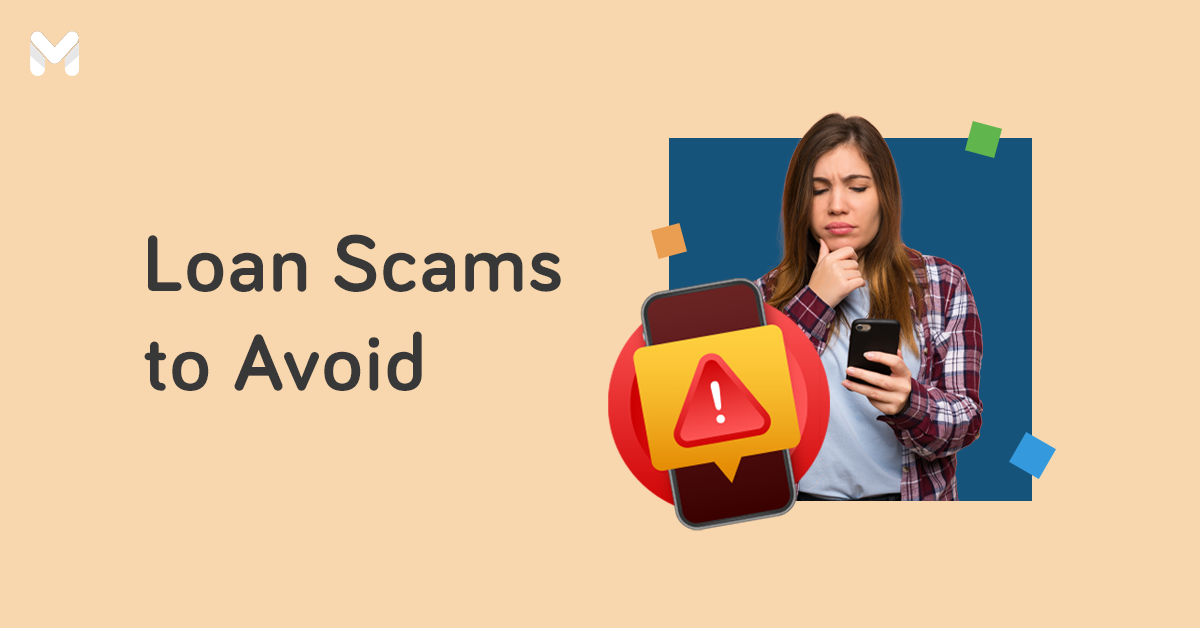According to the 2021 Bangko Sentral ng Pilipinas (BSP) Financial Inclusion survey,[1] 45% of adult Filipinos had outstanding loans—47% borrowed from family and friends and 14% from informal lenders.
Although estimates for the inflation rate in January 2024 slowed down within the range of 2.8% to 3.6%,[2] many Filipinos are still unable to meet their regular spending needs due to the higher prices of basic commodities. Therefore, it’s not surprising that many also fall victim to illegal lending schemes.
Should they fail to make payments on time, however, loan sharks won’t hesitate to resort to harassment to collect. If you’re in the same boat, keep reading to learn how to fight loan shark harassment in the Philippines.
What is a Loan Shark?
-Feb-06-2024-10-18-55-0578-AM.png?width=600&height=400&name=Pics%20for%20blog%20-%20600x400%20(10)-Feb-06-2024-10-18-55-0578-AM.png)
A loan shark is an unlicensed lender. Their lending practice is predatory, often targeting borrowers with bad credit history, offering very bad terms, and using threats and violence to collect debts.
Two known predatory lending practices in the Philippines are 5-6 loans and sangla ATM.
5-6 loan sharks are unlicensed companies or individuals offering unsecured quick cash loans that charge interest rates up to 20% or more, regardless of the amount borrowed. In the case of sangla ATM, lenders offer slightly lower interest rates but require ATMs connected to salary accounts as collateral.
According to the SEC, the Supreme Court has ruled the 5-6 lending scheme illegal. The SEC imposes an interest rate cap on lending companies and their online lending platforms, as the BSP Circular No. 1133 prescribes.
Under the circular, the maximum nominal interest rate is at 6% monthly (or 0.2% daily), while the effective interest rate is at 15% monthly (or 0.5% daily for unsecured covered loans and general-purpose loans not over ₱10,000 and with a four-month tenor).[3]
Unfortunately, according to the BSP, there’s no existing law prohibiting the use of ATM cards as collateral.[4]
Read more: Personal Loan Fees: How Much Does It Cost to Borrow Money?
What are the Illegal Lending Practices in the Philippines?
-Feb-06-2024-10-22-23-4512-AM.png?width=600&height=400&name=Pics%20for%20blog%20-%20600x400%20(11)-Feb-06-2024-10-22-23-4512-AM.png)
These 5-6 loan sharks and sangla ATM lenders are not registered as lending platforms with the Securities and Exchange Commission (SEC). Their practices should discourage you from borrowing from them:
❌ Excessively High Interest Rates
Preying on their victim's desperation, loan sharks charge ridiculously high interest rates. Borrowers must also repay the loans within a short period.
Read more: Need a Financial Boost? Check Out These 19 Low-Interest Personal Loans
❌ ATM Card or ID as Collateral
As mentioned, this money lending system requires borrowers to turn over their ATM cards and share their PIN and other confidential bank account information with a loan shark. Other loan sharks may take a borrower's passport, driver's license, or other IDs as collateral.
As noted above, strictly speaking, it isn't illegal at the moment. But sangla ATM is dangerous because loan sharks could withdraw more than they lend. It also exposes the victim to identity theft, unauthorized transactions, and ATM banking scams.
❌ No Formal Loan Contract
Unlike banks, government agencies, and licensed private lending companies, loan sharks don't provide any written document that specifies the loan terms.
It makes borrowers prone to abuse, like additional extra charges at any time. Because of the absence of a legally binding contract, there's no way to report or file a complaint for any violations of the verbal agreement and laws on lending money in the Philippines.
❌ No Record of Repayments
Aside from the lack of a written loan agreement, loan sharks also don't provide a record of their borrowers' repayments. It allows illegal lenders to increase the debt since borrowers may not track how much they still owe.
❌ Unfair Debt Collection Practices
Loan sharks in the Philippines are notorious for resorting to threats and violence when borrowers can't pay them back. They also pressure people into borrowing more money from them to pay off their loans, burying borrowers deeper into debt.
These illegal lending practices[5] include using threats, insults, obscenities, false representations, and contact at inconvenient times. Lenders or collection agencies should not make any contact before 6 a.m. and after 10 p.m.
In extreme cases, loan shark syndicates even kidnap them and ask their families for ransom money. In February 2020, two Chinese men suspected to be members of a loan shark syndicate kidnapped a fellow Chinese national after he failed to pay his ₱1 million loan. According to police, the victim already paid ₱1 million in a wire transfer, but the suspects refused to release him and demanded an additional ₱1 million.[6]
How to Fight Loan Shark Harassment in the Philippines
-Feb-06-2024-10-28-01-6249-AM.png?width=600&height=400&name=Pics%20for%20blog%20-%20600x400%20(12)-Feb-06-2024-10-28-01-6249-AM.png)
What happens if you don't pay a loan shark?
Note that the Bill of Rights (Art. III, Sec. 20) of the 1987 Charter protects borrowers from being imprisoned for debt. However, if all terms of the loan agreement are written and agreed upon by both parties, the borrower is still liable to pay off any borrowed amount from a lender.
Still, your inability to pay should not give any lender the right to harass, abuse, or disregard your rights as a person. If you’re a victim of unfair debt collection practices, here’s how to deal with these loan sharks:
✔️ Record Your Transactions
Keep a copy of all documents about the loan and record all contacts and transactions made with the lender or its representative. Record all details of calls, including the name of the person calling, from what agency, for what purpose, and inappropriate remarks made, if possible.
✔️ Secure Proof
Most loan sharks resort to social media bullying by posting the borrower’s details to discredit the subject. In this case, take a screenshot of the inappropriate post and immediately report the act to the NBI Cybercrime Division or the PNP-ACG.
✔️ Report the Loan Shark to Appropriate Authorities
You may approach different government agencies in the Philippines depending on the nature of loan shark harassment. The SEC can assist borrowers who are being harassed by lenders, depending on the issues raised.
Where to Report Loan Sharks in the Philippines
If the complaint may result in civil or criminal liabilities, the complainant should seek assistance from the regional courts.
📌 National Privacy Commission
For violations of the Data Privacy Act of 2012, borrowers may seek help from the National Privacy Commission (NPC).
- Address: 5F Delegation Building, PICC Complex, Vicente Sotto Avenue, Pasay City, Manila 1307
- Telephone: (02) 82342228 local 114 for complaints
- Mobile: 09055061478; 09708180555
- Email: info@privacy.gov.ph
📌 NBI Cyber Crime Division
For violations of the Cybercrime Prevention Act of 2012, borrowers should file a complaint with the National Bureau of Investigation-Cybercrime Division (NBI-CCD) or the Philippine National Police-Anti-Cybercrime Group (PNP-ACG).
- Direct line: 8252-6228
- Mobile: 09296607861; 09454420773
- Email: ccd@nbi.gov.ph
📌 PNP Anti-Cyber Crime Group
- Address: Camp Rafael T. Crame, Quezon City
- Email: acg@pnp.gov.ph
📌 Securities and Exchange Commission
You may also file a complaint with the SEC by downloading and filling out the complaint form[7] and attaching all your supporting proof or evidence. You must also provide a scanned copy of a valid government-issued ID.
- Address: G/F North Wing Hall, Secretariat Building, PICC Complex, Vicente Sotto Street, 1307 Pasay City (weekdays from 8 a.m. to 5 p.m.)
- Email: cgfd_md@sec.gov.ph
📌 Bangko Sentral ng Pilipinas
You may also file a complaint against BSP-supervised financial institutions.[8] Download and fill out the BSP Complaints, Inquiries, and Requests (CIR) Form and provide proof and supporting documents.
- Email: consumeraffairs@bsp.gov.ph
- BSP Webchat: www.bsp.gov.ph
- SMS: 21582277
- Facebook: www.facebook.com/BangkoSentralngPilipinas
As per RA 9474 or the Lending Company Regulation Act,[9] violators will be fined an amount of not less than ₱10,000 but not more than ₱50,000; or imprisoned for not less than six months but not more than 10 years, or both, at the court's discretion.
Read more: Ask Moneymax: What to Do When Harassed and Threatened by Lenders? SLAP!
How to Avoid Loan Sharks
-Feb-06-2024-10-29-15-0887-AM.png?width=600&height=400&name=Pics%20for%20blog%20-%20600x400%20(13)-Feb-06-2024-10-29-15-0887-AM.png)
Be careful when dealing with lenders to ensure you won't go through the harrowing experience of borrowing from a loan shark. Keep these tips in mind:
- Beware of lenders who reach out to you. Loan sharks typically use public records to get the contact details of their potential victims. If you get an email or text message from a stranger offering you a loan, just ignore it. Legitimate lenders don't do that.
- Know the signs of loan sharks. This includes pushy sales tactics so you’re pressured into getting a loan.
- Check if the lender is licensed. Use the Securities and Exchange Commission (SEC) website to verify if the lender is authorized to operate in the Philippines.
- Look for the lender’s name in the list of loan sharks in the Philippines. Check the SEC's list of lenders with revoked or suspended certificates of authority.[10] Some companies with revoked certificates of authority to operate as a lending company include:
- Robocash Finance Corporation
- Kwarta Line Lending Inc.
- 163 Lending Corporation
- Bymoney Lending Corporation
- Greenfund Credit Corporation
- Say no to no contracts. There should be paperwork like application forms, loan agreements, and receipts. If they can’t provide these, they’re operating illegally.
- Read and understand the terms and conditions. Some lenders may give you easy access to credit. But they usually charge hidden additional fees in the small print of their terms and conditions.
- Check the interest rates. Loan sharks charge as much as 20% interest (some even higher) and demand you to pay within a shorter period.
- Don’t sign any blank documents. This is a huge red flag. Any document with your signature on it can be used to blackmail or bind you in a contract, even if you never actually agreed to anything.
- Manage your loans responsibly so you don't have to transact with loan sharks as payment for your outstanding balances.
- Explore other ways to borrow money. If you’re declined for a personal loan from a bank or government agency, try other licensed private lenders who may consider approving a loan even if you have a low credit score or income.
Read the articles below to discover legit loan options:
- How to Get an Emergency Loan in the Philippines ASAP
- 17 Loans With Easy Application and Approval in the Philippines
- Bye, Petsa de Peligro: Here are 15 Salary Loans to Tide You Over
- Borrowing Made Easy: Top Cash Loans Without a Bank Account
Final Thoughts
Borrowing money is a huge responsibility. Whether dealing with a loan shark or a legitimate lender, you must repay the funds you owe. But remember that the law protects you against illegal lending practices in the Philippines.
Since it's common for most loan sharks in the Philippines to use unlawful practices to pressure borrowers into repaying their loans immediately, avoid them at all costs. However, if the worst happens, you must know how to fight loan shark harassment in the Philippines and seek help from the proper government agency.
Lastly, choose a legitimate personal loan from registered lenders. Check out your best options below and apply via Moneymax:
|
Provider
|
Loan Amount
|
Monthly Add-on Rate
|
Loan Term
|
Minimum Annual Income
|
Approval Time
|
|---|---|---|---|---|---|
|
UnionBank Personal Loan
|
Up to ₱2 million
|
26.9% per annum
|
12 to 60 months
|
₱250,000
|
As fast as 5 minutes
|
|
UNO Digital Bank Personal Loan
.png?width=149&height=52&name=Unobank-Logo-Colored_Horizontal-Medium%20(for%20MMX).png) |
₱10,000 to ₱500,000
|
1.79% per month (corresponds to annual contractual rates or annual percentage rates ranging from 35.78% to 37.54%)
|
Six to 36 months
|
₱240,000
|
Five to seven banking days
|
|
Metrobank Personal Loan
|
₱20,000 to ₱2 million
|
1.25% to 1.75%
|
36 months
|
₱350,000
|
Seven banking days
|
|
BPI Personal Loan
 |
₱20,000 to ₱3 million
|
Maximum annual contractual rate of 28.67%
|
12 to 36 months
|
Inquire with BPI
|
Five to seven banking days
|
|
Tonik Credit Builder
 |
₱5,000 to ₱20,000
|
4.84%
|
Six to 12 months
|
Inquire with Tonik
|
Two banking days
|
|
Tala

|
₱1,000 to ₱25,000
|
0.43% daily
|
Up to 61 days
|
None
|
Five minutes to 24 hours
|
|
HSBC Personal Loan
|
₱30,000 to ₱500,000
|
0.65%
|
Six to 36 months
|
₱168,000
|
Five to seven banking days
|
|
CIMB Personal Loan
|
₱30,000 to ₱1 million
|
As low as 0.83%
|
12 to 60 months
|
₱180,000
|
One to two banking days
|
|
Maybank Personal Loan
|
Up to ₱1 million
|
1.3%
|
Up to 36 months
|
₱300,000
|
Inquire with Maybank
|
|
RCBC Bank Personal Loan
 |
₱50,000 to ₱1 million
|
1.3%
|
Six to 36 months
|
₱360,000
|
5 to 7 banking days
|
|
PSBank Personal Loan
 |
₱20,000 to ₱250,000
|
|
24 or 36 months
|
₱180,000
|
Five to nine banking days
|
Sources:
- [1] 2021 Financial Inclusion Survey (Bangko Sentral ng Pilipinas, 2021)
- [2] BSP expects January inflation to slow down within 2.8% to 3.6% range (GMA News Online, 2024)
- [3] BSP warns public vs sangla-ATM scheme (The Philippine Star, 2023)
- [4] BSP warns public vs use of ATM card as loan collateral (The Philippine Star, 2023)
- [5] SEC Prohibition on Unfair Debt Collection Practices of Financing Companies and Lending Companies
- [6] 2 Chinese ‘loan sharks’ held for kidnapping (Philippine Star, 2020)
- [7] How do I file a complaint? (Securities and Exchange Commission)
- [8] BSP Consumer Assistance (Bangko Sentral ng Pilipinas)
- [9] Republic Act 9474 Lending Company Regulation Act
- [10] List of Revoked and Suspended Lending Companies (Securities and Exchange Commission)
DISCLAIMER: The information provided on this website does not, and is not intended to, constitute legal or financial advice. All information, content, and materials available on this site are for general informational purposes only. Information on this website may not constitute the most up-to-date legal or other information and is subject to change without notice.
No user of this site should act or refrain from acting on the basis of information on this site without first seeking legal advice from their own attorney in the relevant jurisdiction. Only your individual attorney can provide assurances that the information contained herein – and your interpretation of it – is applicable or appropriate to your particular situation. Use of, and access to, this website or any of the links or resources contained within the site do not create an attorney-client relationship between the reader, user, or browser and website authors, contributors, contributing third parties, and their respective employers.
All liability with respect to actions taken or not taken based on the contents of this site are hereby expressly disclaimed. The content on this posting is provided “as is;” no representations are made that the content is error-free.









